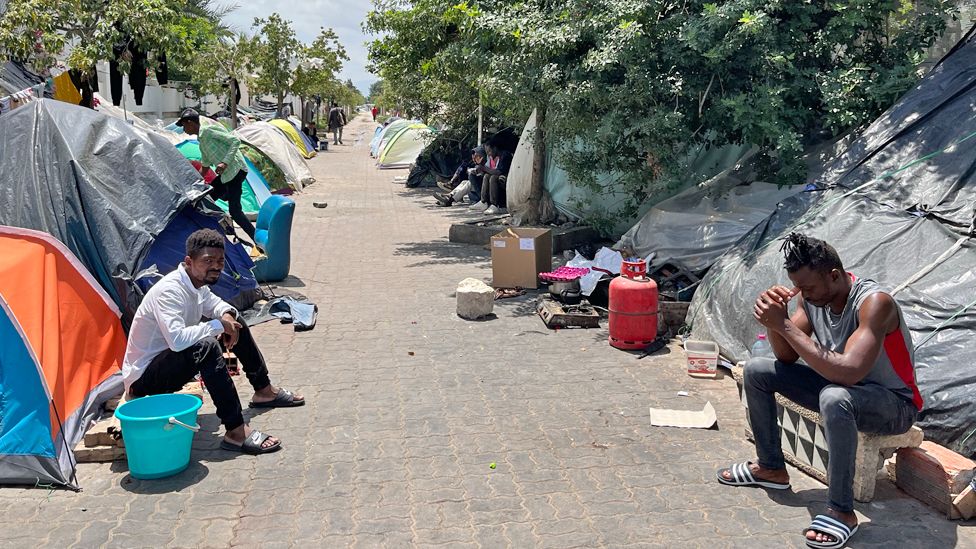As the number of migrants trying to reach Europe rises, so does the number of deaths in the Mediterranean.
As European Union officials struggle to curb the exodus, the plight of people fleeing poverty and persecution is taking its tragic toll on Tunisia’s shores.
As the sun creeps over the horizon off the shores of its east coast, fisherman Osama Dabebi begins to pull in his nets. His face stares anxiously at its contents because sometimes fish isn’t all he finds.
“Instead of taking out fish, sometimes I get dead bodies. The first time I was afraid, then step by step I got used to it. After a while, taking out a dead body from my net is like taking out a fish.”
The 30-year-old fisherman, wearing a dark hoodie and shorts, says he recently found the bodies of 15 migrants in his nets over a three-day period.
“Once I found a dead baby. How is a baby responsible for anything? I was crying. For adults it is different because they have lived. But you know, he didn’t see anything about the baby.”
Mr Dabbebi has been fishing in these waters near Tunisia’s second city Sfax since he was 10 years old.
In those days, he was one of many who cast their nets, but now he says most fishermen have sold their boats for huge sums to people smugglers.
“Many times smugglers have offered me incredible sums to sell my boat. I always refused, because if they used my boat and someone drowned, I would never forgive myself.”

Many African migrants are determined to reach Europe in the hope of a better life
A short distance away, a group of migrants from South Sudan – which has been wracked by conflict, climate shock and food insecurity since its independence in 2011 – walks slowly away from the port.
All eventually hope to make it to the UK. One explains that they reluctantly abandoned a second attempt to cross to Italy due to an overcrowded boat and deteriorating weather.
“There were so many people and the boat was very small. We were still going to go, but when we pushed off the coast it was really windy. There was too much wind.”
According to Tunisia’s National Guard, 13,000 migrants were forced to abandon their often overcrowded boats near Sfax and return to shore in the first three months of this year.
Between January and April this year, some 24,000 people left the Tunisian coast in makeshift boats and reached Italy, according to the UN refugee agency.
The country has now become the biggest departure point for migrants trying to reach Europe. Libya previously had this dubious recognition, but violence against migrants and kidnappings by criminal gangs have led many to travel to Tunisia instead.

Most fishermen in Sfax have sold their boats for huge sums to people smugglers
Many of their rusting and rotting ships lie either half submerged in water or piled up in huge piles by the harbor of Sfax. Lost reminders of the dangers of the world’s deadliest known migration route.
Another stark reminder can be found at the cemetery on the outskirts of town.
Rows of freshly dug graves lie empty in an extended part of the cemetery awaiting the next loss of life at sea.
But they won’t be enough. A new cemetery dedicated entirely to migrants is now being planned.
In just one two-week period earlier this year, more than 200 migrant bodies were pulled from the sea here.
More than 27,000 have died trying to cross the Mediterranean since 2014.
This accelerating tragedy is creating great hardship for the city.
Regional health authority director Dr Hatem Sherif says there are simply no facilities to deal with so many deaths.
“The capacity of the hospital morgue is 35 to 40 max. That’s usually enough, but with all this influx of bodies getting worse, it’s way beyond the number we can handle.”
About 250 bodies were brought to the mortuary recently. Most had to be placed in a refrigerated adjacent room, grimly called the “crash chamber,” one on top of the other. Although Dr. Sheriff was keen to point out that they will all be buried in separate, numbered graves.
Many of the dead are unidentified, so DNA tests are arranged and the results are carefully stored.
The idea is to allow relatives searching for loved ones to see if they are buried here by checking for matches with their own DNA.

African migrants in Tunisia say they have become targets of racist attacks
A three-hour drive northwest in central Tunisia, several hundred members of Tunisia’s black minority, many of them women and children, are camped in small tents outside the offices of the International Organization for Migration.
All were driven from their homes and fired from their jobs in the city after an inflammatory racist speech in February by the country’s president, Qais Syed.
He claimed that “hordes” of illegal migrants were entering the country as part of a “criminal” plan to change its demographics.
The comments are widely seen as an attempt to find scapegoats for the country’s dire economic crisis, which has driven many desperate Tunisians to become migrants themselves.
Pointing to a recent stab wound on his hand, a young man originally from Sierra Leone – still recovering from a brutal civil war that ended in 2002 – said that after the president’s speech, local youths with knives attacked many people here.
“Some Arab boys came here to attack us. The police said they would keep us safe if we stayed here. But if we go outside that zone, we are not safe.”
This alarming situation, and the ongoing jailing of opponents and the erosion of civil rights by the country’s president, appears to be less of a priority for EU officials than curbing the flow of migrants.
More than 47,000 migrants have arrived in Italy so far this year, a three-fold increase on the same period last year, and calls for action to do something have grown.
During a brief visit here earlier this month, a visiting delegation led by European Commission chief Ursula von der Leyen pledged a possible financial support package of nearly 1 billion euros ($1 billion; £850 million).
If approved, about one-tenth of this amount will be spent on measures against human trafficking.
Last week’s tragedy off the Greek coast has intensified calls for something to be done.
Yet, with many migrants so desperate and people smuggling so profitable for traffickers, stemming the growing flow of small boats will be very difficult to do.
Crowds of migrants from across Africa and parts of the Middle East gather in groups in shady spots on the streets of Sfax.
Some have the means to pay for a place on a trafficker’s boat, others live in limbo, unable to even pay for their food and shelter.
Many have either lost their passports or had them stolen, while some never had one after leaving their country illegally.
Everyone has heard of the deaths of so many trying to reach Europe, but it seems desperation continues to outweigh the danger, as one young man from Guinea made clear.
“We can’t go back to our country because we don’t have money or passports. I’m not afraid. I am starving, there is so much poverty (at home) and my parents have nothing. I don’t want my children to live like this. I have to go.”
The tragedy is that this basic human drive for a better life so often comes at such a high price.


